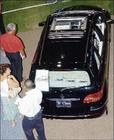
Andrew Smith/Photography Editor
Patrons view the 2007 Mercedes Benz Sports Tourer at the ScotiaWheels grand car show at the National Arena on Saturday, November 25, 2006. Car shows offer excellent opportunities to see what the market offers.
Paul Messam, Gleaner Writer
Buying a car involves careful consideration about a number of factors, especially if it is your first car.
"The first thing you need to do is see how much money you have and how much you are willing to spend on that car," advises a young professional who recently acquired her first car. "The heart is leading you in the desire, the wallet represents the affordability and the head is leading you in terms of sensibility, and it also makes the ultimate decision;" she adds.
There should be no great haste in buying a motor vehicle. It requires careful thought and the cash, as Donald Williams, former vice-president, credit risk management, Bank of Nova Scotia, explains.
"A prospective buyer, must be able to take care of his general living expenses without putting pressure on his budget."
According to Williams, whenever one purchases a car, there will be other added expenses such as insurance, general and timely servicing, which involves tyres, oil changes, filter changes, brakes, shocks, plugs, to name a few. "The person who has the desire to purchase a car should be able to adequately meet the demands of these expenses and have enough residual income to meet the other demands. If his residual income cannot meet the demands, then one is not yet ready to buy a vehicle.
"In addition, the buyer should try to locate a financial institution that will give the most flexible terms at the cheapest interest rate. Flexible meaning longer terms, less equity and flexible interest rate.
Mr. Carol Nangle, an examiner with over 30 years experience, also advises that anyone who is desirous of buying a motor car must be prepared to maintain it. He proposes some questions which should be carefully studied and answered.
1. Is your present car costing you more to operate than you can properly afford?
2. Does it need a major repair job, estimated at say 30 per cent or more of your equity in it?
3. Is it no longer adequate to serving your real needs?
4. Do you worry about its safety and road worthiness?
Five points to consider when buying a car
1: Ensure that as a buyer you know what you want. What are your needs? How many people must the car accommodate? A shiny, red- hot sports car may be a 'sell-off' when you are just married, but where are you going to put that sweet, cute baby later? Maybe you will be taking elderly parents or relatives for drives around town or out into the rural parts. If so, a two-door car is apt to prove inconvenient. If you have several children and lead an active sub-urban life, a station wagon is probably your best buy.
2: How much can you afford to pay? Will it be a used car or brand-new vehicle? Bear in mind that a small new car is a more economical buy than a large used car. Depreciation will be higher, but it will be cheaper to maintain. There will be longer, fuller warranty coverage. You will save on fuel, oil and tyres, with every mile you drive.
3: It is a wise idea to study performance reports. The more you know about cars, the better chance you will have of driving a good bargain. Study road test reports in magazines, auto features or newspapers. Examine buyers guides, talk to relatives, friends, car dealers, both used and new to get their input.
4: Inspect the car carefully and drive it before you buy. Ensure that your mechanic or trusted experienced friend is with you. Even if it is a new car, do not make up your mind until you have examined and compared at least three different lines of cars in the size and price range you are after.
5: Remember, before the delivery of or picking up of the new or used car, see that the gauges, warning lights, windshield wipers and washer, radios, seatbelts and everything work. Check the spare tyre and tools. It might be time consuming, but it is easier to get adjustments made before you drive away than by returning at a later date.

